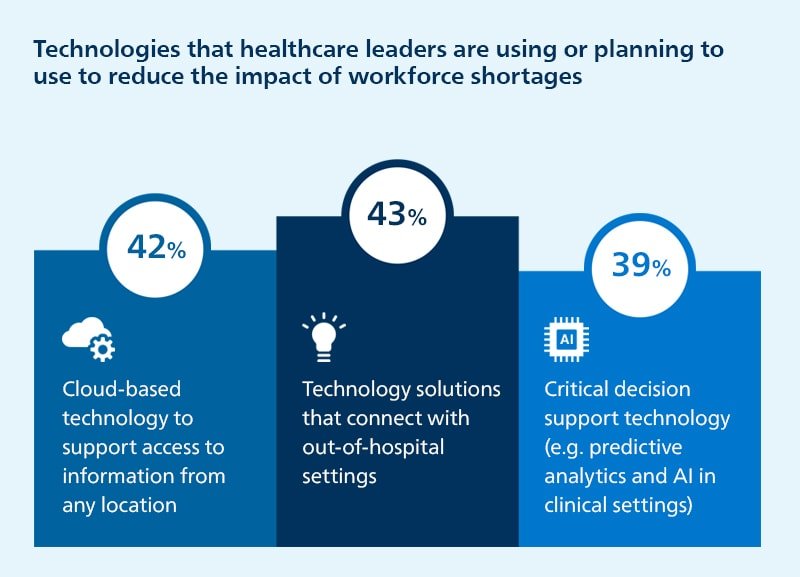I stand at the edge of revolution, holding the hand of a technology that is set to redefine the very essence of patient care – Artificial Intelligence (AI). Its impact is heralded to not only improve operational performance in hospitals but also to enhance medical treatments and ultimately save lives. Welcome to the healthcare transformation led by AI, where the latest tech isn’t just catching up with human limitations—it’s soaring past them.
When we think of AI in healthcare, our minds often venture into the realm of robotic surgeries and diagnostic algorithms. However, the real charm of AI lies not in the surgical steel of a robotic arm, but in the amalgamation of data analysis and decision-making processes that it brings to the table.
Today, we’ll explore how AI’s operational prowess can streamline hospital workflows, reduce errors and waiting times, and foster a healthcare system that delivers on the promise of modern medicine.
Redefining Efficiency with AI
Operational efficiency is the backbone of any successful healthcare institution. It dictates everything from patient wait times and resource allocation to the accuracy and speed of diagnoses and treatments. The complexity of hospital operations is overwhelming—patient triage, room assignments, surgical schedules, staff rotations, and more are all part of a complex puzzle that AI is uniquely poised to solve.
Triage and Patient Flow Management
The front lines of many hospitals are often a battlefield of prioritization. AI-based systems are stepping into this fray to assist with patient triage, ensuring that those in critical condition are moved to the head of the line. It doesn’t stop there. Advanced AI algorithms, backed by deep learning, can predict patient admission rates, enabling hospitals to staff appropriately and keep abreast of demand surges without overloading or underutilizing resources.
Staffing and Resource Allocation
One of the most significant challenges healthcare institutions face is predicting resource needs. AI tools mine historical data to identify patterns and forecast demand, ensuring that staff levels are optimal and critical resources are available when and where they are needed. By analyzing these patterns, AI can even predict and prevent bottlenecks before they occur, ensuring a smoother operation.
Administrative Tasks
Think of all the mundane administrative tasks that occupy healthcare workers’ time—scheduling, billing, and record-keeping, to name a few. AI can handle these with mechanical efficiency, freeing human hands and minds to focus on patient care. Speech recognition and natural language processing tools can transcribe physician notes and update patient records in real-time, reducing the risk of transcription errors and ensuring that the most current and accurate information is available to care teams.
The Surge of AI in Patient Care
AI is not just about improving hospital operations. It’s about enhancing the very care experience that patients receive. From personalized treatment plans to robotic assistance in surgeries, AI’s footprint in patient care is growing rapidly.
Personalized Medicine
With the volume of healthcare data doubling every two years, AI’s prowess in sifting through this information is invaluable. It enables the creation of personalized treatment plans based on a patient’s unique genetic makeup, lifestyle, and medical history, maximizing effectiveness and minimising side effects.
Robotic Assistance
Robotic process automation (RPA) and robotic surgeries are becoming increasingly prevalent. These technologies not only lead to smaller incisions and shorter recovery times but also ensure the precision and lack of fatigue that are quintessential in complex surgeries.
Predictive Diagnostics
AI excels at predictive analytics. It can mine patterns in patient data to identify risk factors for diseases, enabling physicians to take preventative measures before a health condition escalates. Furthermore, AI can flag inconsistencies in medical images that may be missed by the human eye, providing an additional layer of diagnostic certainty.
The Ethical Dilemma
AI in healthcare presents an ethical conundrum that cannot be overlooked. Concerns about data privacy, job displacement, and the potential for AI to exacerbate healthcare disparities are valid and must be addressed. The onus is on healthcare providers and policymakers to tread carefully, ensuring that the benefits of AI are equitably distributed and that patient data remains secure and confidential.
Nevertheless, the potential for AI to revolutionize healthcare is immense. By equipping care teams with the tools to make better decisions faster and facilitating more patient-centric healthcare models, AI can lead to a future where health outcomes are improved, costs are reduced, and patient satisfaction reaches new heights.
In conclusion, while the integration of AI in healthcare is still in its early stages, the outlook is promising. With responsible oversight and a commitment to serving patients, AI will continue to be a beacon of innovation, showing us just how much more we can achieve in delivering exceptional patient care. Our role as stewards of this technology is to harness its power for the greater good and to ensure that, in the end, AI in healthcare reflects the very heart and soul of medicine – the well-being of the patient.
